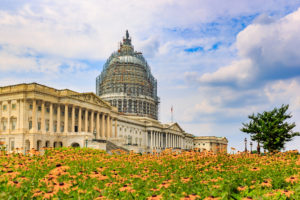
Court rules Trump administration must maintain DACA, CMS allows implementation of community engagement requirements, and more…
IN THE NEWS
- A judge in the U.S. District Court for the Northern District of California ruled that the Trump Administration must “maintain the Deferred Action for Childhood Arrivals (DACA) program on a nationwide basis” as litigation continues. Under the ruling, however, the Trump Administration only needs to continue DACA protections for those who have already benefitted from the protections; it does not have to extend protections to new applicants. President Donald Trump tweeted that the ruling “just shows everyone how broken and unfair our Court System is.”
- The Centers for Medicare and Medicaid Services (CMS) informed state Medicaid administrators that those administrators may impose “community engagement” requirements for able-bodied adults to receive Medicaid benefits. Community engagement would include vocational training, education, volunteering, or working. CMS reasoned that the policy shift aims “to promote better physical and mental health.” MaryBeth Musucemi of the Kaiser Family Foundation reportedly said the decision “will penalize individuals by having them lose health coverage” rather than promote health.
- The Federal Energy Regulatory Commission (FERC) unanimously rejected U.S. Secretary of Energy Rick Perry’s proposal to pay coal and nuclear plants for providing grid resiliency and reliability services because the proposal did not satisfy the requirements of the Federal Power Act (FPA). In its rejection, FERC said that neither the proposed rule nor the record satisfied the FPA requirement of demonstrating that the existing rates were “unjust and unreasonable.” In response to FERC’s decision, Perry stated he “appreciates the Commission’s consideration and effort” and that he “looks forward to continuing to work with the Commissioners to ensure the integrity of the electric grid.”
- The U.S. Department of Labor announced a new policy it will follow when deciding whether, under the Fair Labor Standards Act, interns are employees—and therefore are entitled to get paid. To decide, the Labor Department will ask whether the intern or the employer is the “primary beneficiary of the relationship.”
- The U.S. Department of Agriculture’s Food Safety and Inspection Service (FSIS) issued a proposed rule that would tighten regulations governing the makers of egg products. Under the proposed rule, makers of egg products would, among other requirements, have to comply with “general sanitation requirements” and would have to eliminate “detectable pathogens” like salmonella from egg products. FSIS called the proposed rule “a critical step forward in making egg products safer for Americans to eat.”
- Forty-three Democratic senators, led by Senator Edward J. Markey (D-Mass.) signed a resolution under the Congressional Review Act that would block the Federal Communications Commission’s repeal of net neutrality. Markey said, “We can force a vote to restore net neutrality and level the playing field away from the big corporations.” The resolution requires 30 signatures for a Senate vote. Meanwhile, Nebraska State Senator Adam Morfeld (D) introduced a bill in the Nebraska Legislature that would impose net neutrality in the state.
- The U.S. Department of Homeland Security (DHS) announced its intention to terminate the Temporary Protected Status (TPS) program for Salvadorans in September 2019. After reviewing the “disaster-related conditions” that prompted the designation, DHS determined that “the original conditions caused by the 2001 earthquakes no longer exist” and under the Immigration and Nationality Act, the “designation must be terminated.” Secretary of Homeland Security Kirstjen M. Nielsen said the effective date of the termination “will allow Congress time to craft a potential legislative solution” for addressing the “lack of an enduring lawful immigration status of those currently protected by TPS.”
- The U.S. Food and Drug Administration (FDA) released guidance pertaining to four rules implemented under the Food Safety and Modernization Act. The guidance stated that FDA intends to “exercise enforcement discretion” concerning certain facilities and requirements for these four rules and FDA intends to pursue rulemaking to change the applicability of certain requirements. FDA announced that during the enforcement discretion period, FDA “does not intend to enforce these provisions as they currently apply to certain entities or activities.”
- The U.S. Environmental Protection Agency (EPA) reportedly said that it is on course to have fewer employees than in 1988, President Ronald Reagan’s last year in office. EPA had about 15,000 employees this time last year. But, as employees accept buyout offers, the agency reportedly expects staffing levels to fall below 14,440 by October.
- New York City announced that it has filed a lawsuit against five large oil companies to recover money “to fund climate change resiliency measures that the City needs to protect the City and its residents.” Additionally, Mayor Bill de Blasio and Comptroller Scott Stringer announced a plan to divest city funds—almost $5 billion—from fossil fuel companies.
- The U.S. Securities and Exchange Commission (SEC) temporarily suspended trading of UBI Blockchain Internet, a Chinese company that provides blockchain services. The SEC halted trading of UBI securities due to concerns of the accuracy of the company’s disclosures and suspicious trading activity. From December 11 to December 18, shares of UBI increased from $9 to $87.
WHAT WE’RE READING THIS WEEK
- In a forthcoming article for the Fordham Environmental Law Review, Daniele Bertolini of Ryerson University and Carolina Arlota of the University of Oklahoma School of Law examined the U.S. Supreme Court’s decision in Michigan v. EPA, which held that EPA acted “unreasonably” in declining to consider costs when implementing a regulation. Bertolini and Arlota argued that cost consideration “is an essential component of ‘logical and rational’ agency decision making.”
- In a working paper for the European Corporate Governance Institute, Roberta Romano, a professor at Yale Law School, considered the effect of agency structure on agency actions. Using statistics on the Consumer Financial Protection Bureau, the Commodity Futures Trading Commission, the Consumer Product Safety Commission, and the Securities and Exchange Commission, Romano found “that agency structure influences agency decisionmaking.” Romano observed that the more independent an agency is from congressional control, the less the agency employs “the most publicly accountable regulatory instrument of notice-and-comment rulemaking.”
- In a paper, David A. Balto, an antitrust lawyer and former Assistant Director of Policy and Evaluation at the Federal Trade Commission, discussed Federal Communications Commission Chairman Ajit Pai’s Restoring Internet Freedom Order (RIFO), which repealed net neutrality, and how Chevron review—considering whether an agency’s statutory interpretation was reasonable—will apply. Balto determined that RIFO will likely be upheld, but overturning RIFO would “almost certainly be a reinterpretation of Chevron.”



